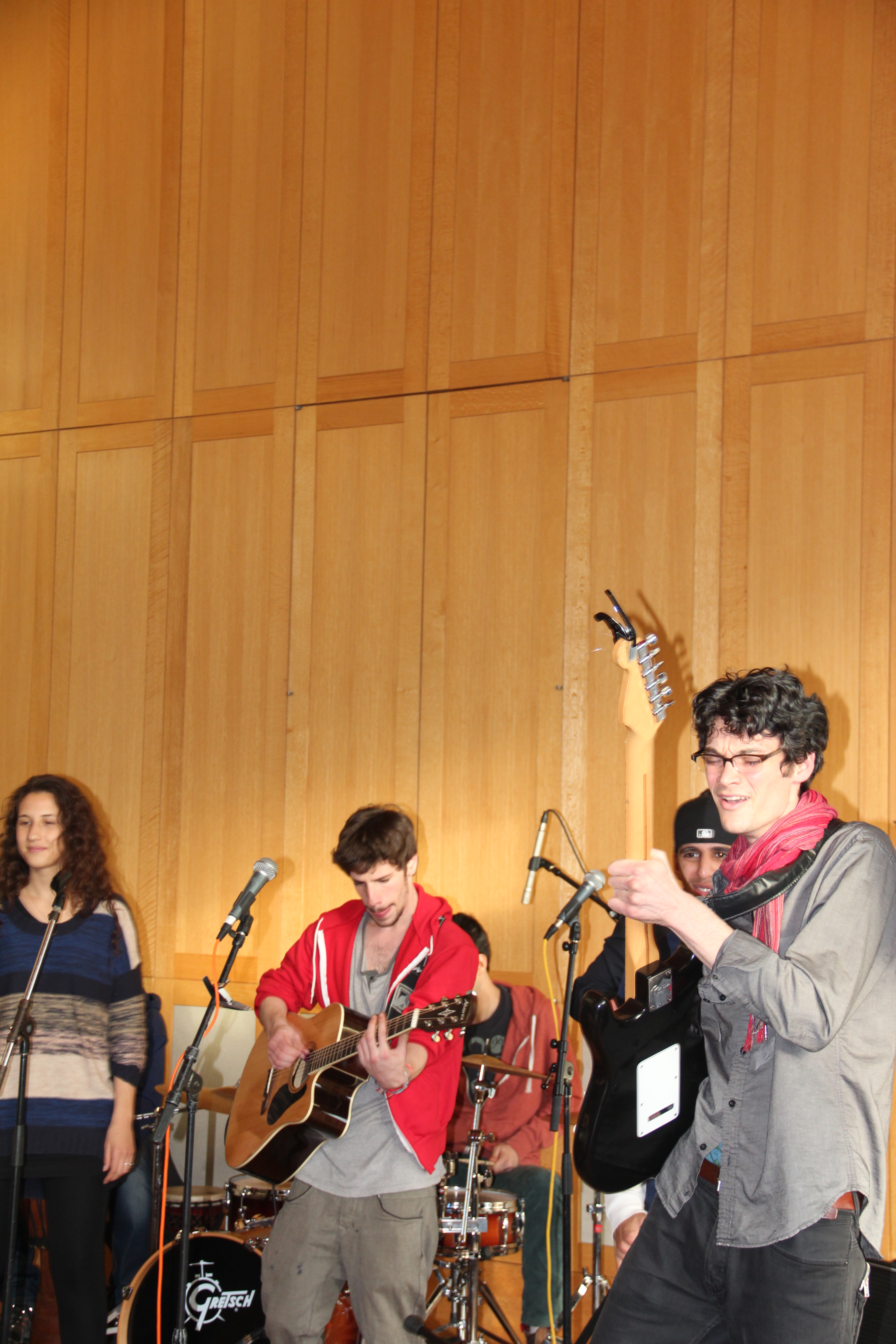
by Zoe Rubin
“Bukra fi mishmish,” sang Guy Geffen, a musician and activist from Rehovot, Israel. The rest of his ensemble—a group of singers, rappers, gutairists, violinists, guitarists, and drummers—repeated the phrase. Blending and harmonizing, the chorus grew louder and louder: “Bukra fi mishmash!”
‘Bukra fi mishmash’ is Arabic for ‘when pigs fly.’ Or, as Geffen emphasized, “when the impossible becomes possible.” For he and his bandmasters, it’s mantra that they live by every day.

On Sunday afternoon, the Slifka Center played host to Heartbeat, a group of Israeli and Palestinian youth musicians from the Jerusalem, Haifa, and Jaffa – Tel Aviv areas. Founded in 2007, Heartbeat is working to build an Israeli-Palestinian youth music community through programs, music videos, concerts, and workshops. Their concert at Slifka was but one stop on their first promotional tour of the United States that started in February in Maine and will end this week at the U.S. State Department. The bulk of the concert was devoted to performing Heartbeat’s original music. However, the band members also spent considerable time answering questions, sharing their own musical background and cultures, and even teaching the audience some of Heartbeat’s songs.
Heartbeat’s founder and executive director, Aaron Shneyer, stressed that the organization is intentionally non-political. Instead of supporting certain peace settlement stipulations, Heartbeat hopes to create opportunities for Israel and Palestinian musicians to collaborate together and, in doing so, to speak out through song. Their writing process emphasizes cross-cultural collaboration, responsibility, and listening. Through retreats and improvisation, participants learn to build collective trust.
“You can never go wrong, because what you play comes out of you,” said Siwar Mansour, an 18-year old Palestinian from Tiva. For Mansour, who plays the Classical and Arabic violin and the ukulele, the connections that she has made through Heartbeat transcend traditional boundaries. “When you love someone so much,” she told the rapt audience, “It does not matter what their political views are.”
Self-empowerment through music was a common theme in the musicians’ lyrics and stories. In Arabic, Mohammed “Moody” Kablawi, a 17-year old Palestinian from Haifa rapped, “to be free you have to liberate yourself!” Involvement in Heartbeat has given its participants the confidence to take a common stand against the normalization of war in their societies. “ I feel strong to do things—to change things,” said Geffen, “I have the power to make things happen.”
The songwriters did not shy away from addressing divisive issues in their music, including the ongoing creation of a separation wall between Israel and the West Bank and recent events in Gaza. By bringing their message out of the region and to the United States, they hope that their viewers will begin to raise more questions. “We know that we give too much attention to the ones who use violence,” Shneyer said, “we have chosen to support the status quo.” An American himself, he highlighted the striking disparity between the vast amount of military aid the US provides to Israel and the paltry amount of aid allocated to peace efforts: “We get what we paid for.”
For all the optimism and hope of coexistence that the musicians projected, however, they were very cognizant of the reality of their homeland. The same day as the concert, news broke that the Israel’s transportation ministry would be creating Palestinian-only buses for travelers from the West Bank, in response to Israeli settlers’ claim that Palestinian passengers pose a “security risk.” The Washington Post, and other organizations, emphasized that the establishment of separate buses would only further the deterioration of human rights in an occupied territory where different legal codes apply to Israelis and Palestinians.
“What’s happening back home is not this,” said Tamer Omari, Heartbeat’s Co-Program Director based in Haifa, gesturing at the ensemble. He likened the separate bus lines to the racial segregation in America under the Jim Crowe laws. “We are in trouble. And it’s really scary,” his voice shook, “It’s really, really scary.”
Zoe Rubin is a freshman in Timothy Dwight College. Contact her at zoe.rubin@yale.edu.